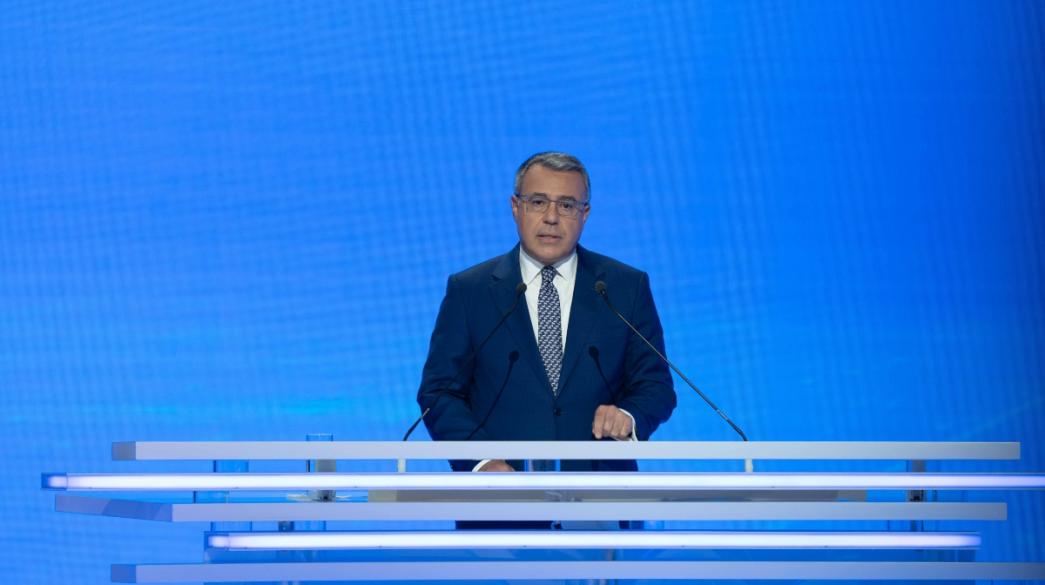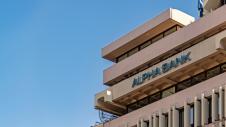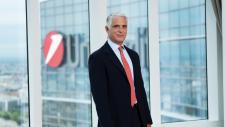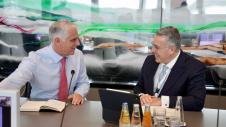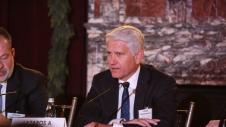The major strategic agreement between Alpha Bank and Italy's UniCredit, a deal of European dimensions that marks in an impressive way the dynamic return of Greek banks, and by extension the domestic economy, to European banking normality after years of isolation, caused a "earthquake" in the domestic market.
This is the first major strategic investment by a European bank in Greece since the outbreak of the great crisis of 2009-2010 in Greece, and the Eurozone crisis that followed, which led to a violent disinvestment of foreign banks from our country. After 2010, all the foreign banks operating in Greece withdrew from the country, for various reasons, the main one being the prolonged instability: Credit Agricole, Societe Generale (France), Millennium (Portugal), Citibank (USA), the Cypriot banks, HSBC (UK), etc.
The deal announced yesterday by the two banks unfolds on three main levels: a) a merger of their subsidiaries in Romania (creating the 3rd largest bank in the country), b) commercial cooperation in the Greek market and c) UniCredit's participation in the share capital of Alpha Bank.
The Italian bank submitted early yesterday morning a proposal to the HFSF for the acquisition of 9% of Alpha Bank's shares controlled by the Fund. Noteworthy of the Italian side's commitment and determination for the deal is the provision, in case the process with the HFSF is not completed, to proceed through the market to acquire up to 5% of Alpha Bank.
The price of the offer was not disclosed while the HFSF, in accordance with the law, will run a competitive process to seek any better offers. As announced late last night, it has started the process of appointing a Disposal Adviser and a competitive process will follow. It may be recalled that the HFSF is also running the process for the disposal of 20% of the shares of National Bank in parallel.
Vote of confidence for banks - Greek economy
The agreement is a strong vote of confidence not only for Alpha Bank and the domestic banking system but also for the prospects of the domestic economy more broadly.
Alpha Bank's CEO, Vassilis Psaltis, who credited this great success, said he was "proud of the achievement of the strategic agreement" adding that it is a vote of confidence for Greece and marks the return of domestic banks to the forefront. He noted that with the agreement Greece welcomes a strategic investor in the banking sector after 17 years.
The Minister of Economy and Finance, Kostis Hatzidakis, welcomed "UniCredit's decision to invest in Alpha Bank", underlining that "the fact that a major European bank is investing in the Greek banking system after many years is proof that both the Greek banking sector and the Greek economy have entered a path of prospects and growth. This positive development is the result of systematic work which the Government is determined to continue".
The Governor of the Bank of Greece, Yannis Stournaras, also welcomed the arrival of UniCredit, underlining that this important agreement does not only concern Greece and Italy, but the whole Eurozone. "The Bank of Greece", noted Mr. Stournaras, "welcomes the UniCredit and Alpha Bank agreement, the first major strategic agreement between a major European bank and a systemic Greek bank since the financial crisis of the previous decade. This agreement reflects the increased credibility of the Greek economy in recent years, as certified by four rating agencies so far, which have assigned an investment grade rating to Greek government bonds. It also reflects the significant progress that has been made in the Greek financial system. The two banks, UniCredit and Alpha Bank, are to be congratulated for the systematic work they have done to reach this important agreement, which is not only for Greece and Italy, but for the whole euro area".
It will be recalled that a few days earlier the Governor of the BoG had publicly expressed his wish for European banks to become strategic partners to domestic banks in the context of the disinvestment of the HFSF.
For its part, the HFSF also reacted positively, noting that it "welcomes and welcomes the strategic agreement between Alpha Bank and Unicredit in relation to the merger of their operations in Romania and the strategic cooperation in Greece, and confirms the receipt of an offer from Unicredit for the purchase of all shares held by the HFSF in Alpha Bank".
Of course, a deal of this magnitude could not have been implemented if the political and economic environment in Greece had not drastically improved in recent years as a result of the systematic work carried out by the government and the economic staff.
As the Prime Minister's economic advisor Alexis Patelis said, "the agreement between the two banks is an excellent start to the disinvestment process and reflects Greece's regained credibility."
It is no coincidence that the announcement of the big deal came just hours after S&P regained its investment grade rating. The initial reaction of analysts to the announcement of the deal was particularly positive.
The structure of the agreement
The strategic agreement between the two credit institutions is structured around three central pillars:
- Merger of the subsidiaries in Romania. The merger of UniCredit Romania and Alpha Bank Romania will create the 3rd largest bank in Romania in terms of assets with a market share of 12%. Upon completion of the transaction, Alpha Bank will retain a 9.9% strategic stake in the new entity and will receive EUR 300 million to complete the transaction. Completion of the transaction is expected in 2024 subject to regulatory approvals and due diligence findings.
- Commercial partnership in Greece. The two institutions have agreed on the acquisition by UniCredit of 51% of the share capital of AlphaLife, a wholly-owned life insurance subsidiary of Alpha active in the pension and savings products sector. They also agreed to distribute UniCredit onemarkets mutual funds through Alpha Bank's network, which serves more than 3.5 million customers in Greece. As highlighted in the announcement, "this partnership will leverage UniCredit's expertise and product diversity in asset management and bank insurance products, while serving as a catalyst to further develop AlphaLife's capabilities and expand the range of asset management services provided to Alpha Bank's Clients".
- Unicredit's entry into Alpha Bank's share capital as a strategic investor. As part of the agreement, UniCredit yesterday submitted an offer to the Hellenic Financial Stability Fund for the acquisition of 9% of Alpha Bank's shares held in the HFSF's portfolio. The purchase price of the shares was not disclosed but sources estimate that the premium from last Friday's close (EUR 1.27) will be close to 15%. The non-disclosure of the details of the proposal led the Securities and Exchange Commission to decide to temporarily suspend Alpha's shares from trading until more details are disclosed. The Alpha - UniCredit agreement provides that in the event that the process with the HFSF is not completed, which will happen if another investor offers a better price for the 9% stake, "UniCredit has committed to purchase through the market a stake equal to the lower of 5% or a different percentage of shares resulting from UniCredit's investment of a total pre-agreed amount within the next 24 months."
As highlighted in Alpha Bank's announcement regarding the long-term benefits of the agreement: "The cooperation with UniCredit supports Alpha Bank's strategy and strengthens the dynamics of its Network, while the expansion of the solutions and services provided accelerates the achievement of the objectives of its Business Plan. In addition, it further enhances Alpha Bank's Customer service capabilities through the exchange of expertise and the utilisation of the full range of UniCredit products, its long-standing presence in the Italian and German markets, as well as its extensive Network in Central and Eastern Europe.
For Alpha Bank, the overall transaction maintains unchanged Net Profit expectations, while further strengthening capital reserves by more than 100 basis points, driving Return on Tangible Equity (RoTE) higher by at least 50 basis points, with the potential for further upside stemming from the commercial agreement."
UniCredit: focus on profitability
Unicredit is Italy's second largest bank (after Intesa Sanpaolo), with assets of €858 billion and a presence in 12 countries, including Germany and countries in central and eastern Europe. Its position in the Italian and European banking sector is central, as it is the only Italian bank considered by supervisors to be systemic at a global level.
With Andrea Orcel at the helm from 2021, who comes from the investment banking sector, Unicredit is constantly raising the bar in terms of profitability and shareholder reward, showing a double-digit return on capital.
Significantly, in July, when presenting its second quarter results, UniCredit raised its net profit and shareholder reward targets in this year's financial year for the second consecutive quarter, as high interest rates drove the bank's earnings much higher than expected.
Thus, for 2023 UniCredit now forecasts net profit to exceed EUR 7.25 billion, up from a previous forecast of EUR 6.5 billion, while shareholders will receive more than EUR 6.5 billion through dividend distributions and share buybacks. The bank also predicted that in 2024 the profit and shareholder reward targets will be roughly the same as the bank continues to reduce operating costs.
As Orcel had said, explaining his strategy to maximise profitability, "we are entering surgically, reducing costs, but not affecting revenues". Orcel has stressed that he does not believe that acquiring other banks is a good investment at the moment and it is better for Unicredit to engage in aggressive buybacks of its shares, which he believes are undervalued, in order to improve returns for shareholders.


